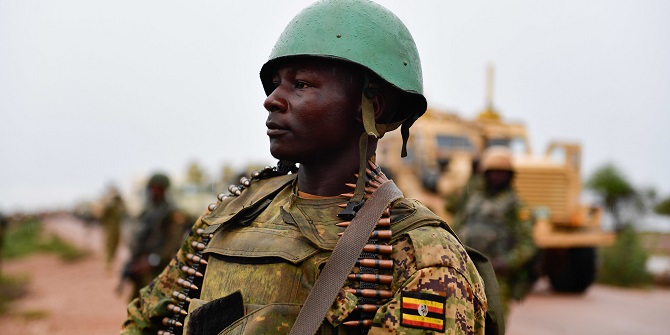For a long time “normative” was a dirty word in international relations and strategic studies circles. While most detested by the purveyors of neorealist, power-oriented perspectives on global affairs, liberal internationalists also tended to shy away from making grand value judgements in favour of more institutionalist, technocratic, data-driven approaches. Both the academic and policy worlds tended to stress cool-headed “objective” metrics over what were (often quite subtly) derided as the less high-minded, emotive world of normative value-based judgements.
Russia’s brazen aggression in Ukraine has begun to change this. As Russian bombs rained down on the houses of civilians, and the Kremlin dispensed with the last pretences that it had any regard for international law, a “normative turn” can be perceived in Western policy circles. The return of full-scale war in Europe woke many up to the importance of reuniting the divided democratic camp against the forces of Russian authoritarianism.
Among the loudest advocates of such a values-first foreign policy has been Benjamin Tallis of the German Council on Foreign Relations. Coining the term neo-idealism, he identifies a movement towards a “morally-based approach to geopolitics, grounded in the power of values”[1] in which normative values are seen “not as luxuries to be set aside when hard-nosed interests are at stake”. Instead, Tallis declares, “For the Neo-Idealists, our values are our interests”, identifying Ukrainian President Zelensky, Estonian President Kallas, and even European Commission President von der Leyen as practitioners of the new approach.
It is true that policymakers in (most) Western capitals now increasingly recognise that defending values like democracy and human rights is core to dealing with the Russian threat. But the idea of a values-based foreign policy is not new. After all, it was way back in 1997 that UK Foreign Secretary Robin Cook declared that he did “not accept that political values can be left behind when we check in our passports to travel on diplomatic business”. Cook ended his cabinet career resigning over the Iraq war, as the foreign policy world moved ever further away from the principles he sought to embed.
Nevertheless, Tallis’ conception of neo-idealism is a welcome and timely one, which deserves further development and thought as it goes beyond the scope of previous approaches such as Cook’s ethical foreign policy. Such approaches often resembled a sort of foreign policy version of corporate social responsibility in that they sought to overlay a moral dimension on top of traditional foreign policy pragmatism. Neo-idealism holds more promise precisely as it seeks to define values as constitutive of national interest, rather than as an afterthought.
However, it is not yet clear what neo-idealist foreign policy means in practice beyond the more extensive use of pro-democracy rhetoric and a vaguely renewed sense of there being, once again, such thing as “the democratic West” in a sense similar to that felt during the Cold War.
Furthermore, the two years since the full-scale Russian invasion of Ukraine have demonstrated how difficult the task of ensuring rhetoric is reflected in policy practice could be. For example, some of Tallis’ named leading lights of the new values-based paradigm, such as Ursula von der Leyen, and Volodymyr Zelensky, lined up to court Ilham Aliyev’s oil-rich authoritarian regime in Azerbaijan as it cracked down on opposition, and, with Russian approval, retook its breakaway region of Nagorno-Karabakh by force in a manner that has led to the effective total disappearance of the country’s ethnic-Armenian population. Then came the brutal Israeli response to the Hamas terror attacks of 7th October 2023. As thousands of Palestinian children died and images of Gaza began to resemble those of Ukraine’s destroyed cities of Mariupol, Bakhmut and Avdiivka, Europe’s ostensibly neo-idealist leaders put realpolitik before principle, failing to condemn the disproportionate bombing of Gaza’s civilian population by Israel’s far-right coalition government.
So is neo-idealism stillborn as a concept? Should we place it alongside Cook’s ethical foreign policy in the ranks of ideas that evaporated when they made contact with the real world?
My answer to this question is an emphatic no.
What neo-idealism needs is to move from being rhetoric to policy reality. We need to walk the walk as well as talking the talk. We need a framework that moves beyond just shouting “democracy” at the top of our voices and explores ways to integrate normative pro-democracy values into the nitty gritty of policy formulation and conversations about national or regional security.
An example of such a concept would be that of democratic security. This is an approach that emphasises the interlinkages between democracy, security, and social justice. It espouses both that democratisation makes us all more secure and conversely that democracy is a value worth defending. But most importantly, it is an approach that seeks to blur the lines between the often very different “worlds” of democracy advocacy and security, and embed a combined approach within the policymaking process.
Adopting such an approach could have many concrete policy implications in practice, some subtle and others radical. In Ukraine, it could mean an approach that it simultaneously more generous in terms of levels of support, but also more principled in insisting that Ukraine does not jettison democratic principles in its fight. In the corridors of Western defence ministries, it will lead to policy approaches that stress defending Ukrainian democratic institutions and bring in civil society. Within the civil society sector, it could lead to a more sober and informed view of the importance of hard security and the need to defend democratic values against the forces of authoritarianism by force.
It could, perhaps most controversially, lead to a questioning of long-standing security alliances with authoritarian or extremist governments in places such as Saudi Arabia or Israel, and closer relations with countries like Mongolia that uphold democratic values despite difficult geopolitical circumstances.
As most experts on Kremlin propaganda will concur, Russia does not seek to convince us that its system is superior. It seeks to convince us that we live in a cynical, realpolitik world in which principles and values do not matter. It points (sometimes even correctly) at Western hypocrisy, urging us to shrug our shoulders and say “they’re all the same”.
By asking “how does this promote our values” in spaces where normativity has traditionally been cast aside as superfluous, we are inoculating ourselves against such attempts to undermine our societal cohesion, and therefore security. There will be real, tangible costs to angering fair-weather friends by insisting on fealty to democratic principle. But the gains of winning back a world in which an overwhelming mass of the population believes that democratic government is, on balance, a force for good that is worth defending would be far greater. This is no longer a given even in supposedly established democratic countries, as cynicism and the popularity of authoritarianism grows.[2]
A democratic security approach would also go a long way to solving the problem of war-weariness and partisan manoeuvring over the question of aid to Ukraine. The forces in the US Congress that seek to portray Ukraine – echoing the Kremlin –as a bloated and corrupt welfare beneficiary that needs to be forced to “negotiate” (i.e. surrender) depend on public support for those narratives. That public support is fuelled by the belief that assistance to Ukraine is a vain endeavour, that global politics should be decided by strongmen dividing up the world in dark rooms, and that talk of principles and values in foreign policy is empty, naïve, and a sign of weakness. This view is prevalent across the political spectrum, with left and right disagreeing mainly over whether self-interested foreign policy is a good thing, not on whether it is truly an inevitability. Clear examples of value-led concerns trumping realpolitik in foreign policy would undermine this view and weaken the hand of those who seek to profit politically from cynicism.
As such, if not just Russia but the Russian-model is to be defeated, we need to use approaches like democratic security to put belt and braces on the idea that the alternative Ukrainians are dying to defend is morally superior. That requires a change in mindset amongst the policymaking elite, but it is a change that can no longer be avoided if we are not all to be pulled into the moral gutter by Putin.
[1] The Rise of the New Idealists – Byline Supplement
[2] Open Society Barometer – Open Society Foundations
This blog is published in partnership with the Democratic Security Institute (DSI) based in Tbilisi, Georgia. It is part of a series of blogs authored by fellows from DSI’s Eurasia Democratic Security Network (EDSN) on the interrelationship between democracy and security in Europe’s eastern neighbourhood. EDSN is supported by the US National Endowment for Democracy (NED).





